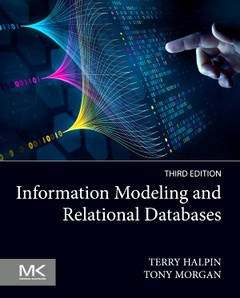Information Modeling and Relational Databases (3rd Ed.)
Auteurs : Halpin Terry, Morgan Tony

Information Modeling and Relational Databases, Third Edition, provides thorough coverage of information modeling approaches, including object-role modeling (ORM), entity-relationship (ER) modeling, and the unified modeling language (UML). It shows how to map models developed with those approaches to a variety of relational and nonrelational database systems, including document databases, column-oriented databases, graph databases, and deductive databases. Process and state modeling, ontological modeling, and metamodeling are also covered. For this new edition, the coverage of ORM, ER, UML, SQL, OWL, and BPMN has been thoroughly updated to include their latest versions. A significant amount of new material has been added. Various data file formats such as CSV, XML, JSON, YAML, and some other markup languages are now covered, and a more thorough treatment is provided for nonrelational databases, especially NoSQL. One of the major features of the book is its large number of exercises, which have been thoroughly class-tested. This book is intended for anyone with a stake in the accuracy and efficacy of databases such as systems analysts, information modelers, database designers and administrators, and programmers.
1. Introduction 2. Information Levels and Frameworks 3. Conceptual Modeling: First Steps 4. Uniqueness Constraints 5. Mandatory Roles 6. Value, Set-Comparison, and Subtype Constraints 7. Other Constraints and Final Checks 8. Entity Relationship Modeling 9. Data Modeling in UML 10. Advanced Modeling Issues 11. Relational Mapping 12. Data Manipulation with Relational Languages 13. Using Other Database Objects 14. Schema Transformations 15. Process and State Modeling 16. Data Interchange 17. NoSQL Databases 18. Other Modeling Aspects and Trends
Dr. Tony Morgan is a British computer scientist, data modeling consultant, and Professor in Computer Science at INTI International University, Malaysia. Dr. Morgan obtained his BA in Earth Sciences from The Open University, his BSc in Computer Systems Engineering from Coventry University, where in 1984 he also obtained his MSc in Control Engineering. In 1988 he obtained his PhD in Computer Science from University of Cambridge with a thesis on automated decision-making using qualitative reasoning. Dr. Morgan has done extensive work in industry with companies such as Unisys, EDS, and other co
- Presents the most in-depth coverage of object-role modeling, including a thorough update of the book for the latest versions of ORM, ER, UML, OWL, and BPMN modeling.
- Includes clear coverage of relational database concepts as well as the latest developments in SQL, XML, information modeling, data exchange, and schema transformation.
- Case studies and a large number of class-tested exercises are provided for many topics.
- Includes all-new chapters on data file formats and NoSQL databases.
Date de parution : 07-2024
Ouvrage de 1032 p.
Thèmes d’Information Modeling and Relational Databases :
Mots-clés :
<; P>; Information modeling; conceptual modeling; relational databases; ORM; Object-Role Modeling; query languages; entity-relationship modeling; data modeling; UML; relational mapping; SQL; XML; schema transformations; process modeling; state modeling; JSON; data interchange; NoSQL<; /P>



